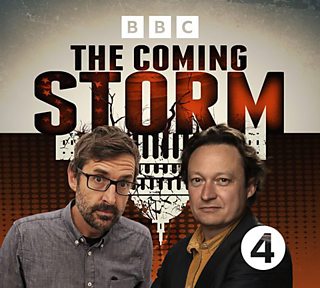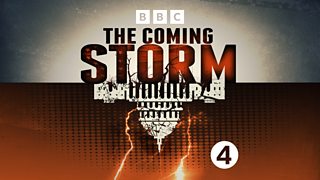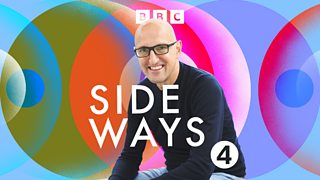The Coming Storm β Eight things we learned when Louis Theroux interviewed Gabriel Gatehouse
On 6th January 2021, supporters of former President Donald Trump stormed the US Capitol in Washington DC, in a bid to thwart Joe Biden's election victory. A year on, for the Radio 4 and World Service podcast The Coming Storm, Gabriel Gatehouse journeys into the dark undergrowth of modern America to explore the origins of the conspiracy that led to the Capitol insurrection. Now, he meets Louis Theroux to discuss his findings.
Here are eight things we learned about the lineages that led to that extraordinary event.

1. The riots were fuelled by a conspiracy theory about a cabal of satanic paedophiles and a stolen election
The QAnon movement was predominantly behind the events of 6th January. And one man – bellowing in the Rotunda of the Capitol in a horned headdress – came to be seen by the media as their mascot. This man is Jacob Chansley – aka Yellowstone Wolf, Jake Angeli, or the QAnon Shaman.
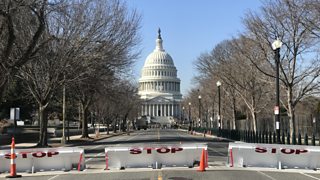
I realised that, actually, Iβd made a big mistake.Gabriel Gatehouse on not interviewing Jake Angeli
Gabriel first met Jacob outside the counting station in Phoenix Arizona, where people believed the election had been stolen. “He starts telling me about this cabal of Satanic paedophiles that he believes are involved in it, and that’s kind of my first exposure to QAnon.” The journalist decided not to interview the shaman for Newsnight. However, two months later, there he was at the centre of the Capitol.
“I realised that, actually, I’d made a big mistake,” says Gabriel. “I had assumed that what he was talking about was this niche thing that had no bearing on the big thrust of world events in American politics, and it was quite the opposite… This story about a cabal of satanic paedophiles that had captured the deep state had got into his head, but it had also spread to the heads of millions of other Americans and it was now the driving force in American politics.”
2. A big source of QAnon’s power was its participatory nature
“The thing that was different about QAnon from all of the previous big conspiracy theories was that it was a participatory thing,” explains Gabriel. “You didn’t just sit there on the internet and passively receive this secret knowledge that would make you feel powerful." There were “Q drops” being left by someone “pretending to be a person in the Pentagon with access to high level secrets.” The pair thought by some to be behind it were Jim Watkins, an “eccentric American pig farmer in the Philippines”, and his “techy” son, Ron, although they deny this.
“[Q was] dropping cryptic clues, so your job as a QAnon adherent was to do the research, do the work, spend lots of time online pulling together the threads, and together you would help bring about The Storm,” explains Gabriel. This would be the moment at which the cabal would be brought down. “You were helping to save the world,” says Gabriel. “I think that was a big source of its power and its strength.”
3. QAnon was born on an online message board called 4Chan
QAnon started its life on 4Chan. “4Chan was this image board, basically a message board, a kind of proto-Facebook before Facebook,” explains Gabriel. One devotee he interviewed described is as "kids who basically felt like they had no hope in life, sat around in their parents’ basements… surrounded by junk food takeaway mess,” trolling people online.
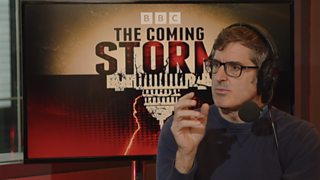
For the QAnon community, Donald Trump is seen as a sort of visionary.Louis Theroux
But before it became that “nihilistic despair space” which gave birth to QAnon, it was where the hacker collective Anonymous planned their attacks on Scientology and big institutions of the global economy (before being squished by the FBI).
4. QAnon believed that Trump was in power to bring down the establishment from the inside
Many QAnon devotees believed that Trump was the only person who could defeat the Satanic elite. “For the QAnon community, Donald Trump is seen as a sort of visionary, a sort of warrior for justice and someone who is going to take down the elites and take down the shadowy evil-doers,” says Louis.
Louis says that, early on, he was struck by the fact that “new-agey people”, ufologists, people involved in crystal energy and cult-like behaviours, saw Trump as one of them. “He really has an extraordinary status to all sorts of fringe figures,” says Louis. “And the central idea in QAnon is that he somehow got into power almost by accident, and is now going to take it down from the inside.”
5. The 90s book that predicted much of what’s happening in the US
The Sovereign Individual: Mastering the Transition to the Information Age, is a book by James Dale Davidson, an American investor, and Lord William Rees-Mogg, former editor of The Times (and father of MP Jacob).
It was written in 1997, and “it’s just incredibly prophetic about what effects the internet is going to have,” says Gabriel. The authors also predict the Trump “base”: that this new technology is going to lead to “an intense and even violent nationalist reaction, centred amongst those who lose status, income and power.”
The book – which predicts that the nation state will die and be replaced by unimaginably powerful, sovereign individuals who will rule the world – turns out to be a bible to various people, including the tech billionaire and huge Trump supporter, Peter Thiel.
6. The βClinton Body Countβ theory was another precursor to QAnon conspiracies
Gabriel explains that the authors of The Sovereign Individual were also amongst those writing about the Clintons in the nineties.
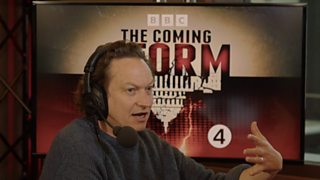
I think itβs time... to talk about the centre β the establishment β versus all the other stuff on the outside.Gabriel Gatehouse
A theory they wrote about from the early '90s suggested that Vince Foster, a Whitehouse lawyer and friend of the Clintons who committed suicide in 1993, had in fact been murdered. One of the authors said he was just trying to get to the bottom of what was a mystery. “This then metastasised into the Clinton Body Count, which said that the Clintons had had upwards of 50 of their political enemies murdered,” says Gabriel. "It was the beginnings of the murderous criminal cabal with Hilary Clinton at its centre.”
These stories were “precursors to the conspiracy theories that fed QAnon and then animated the storming of the Capitol.”
7. Hunter Biden’s laptop gave more fuel to the fire
Joe Biden’s son, Hunter, was in the midst of a breakdown when he left his laptop – containing thousands of emails – in a repair shop. “Hunter Biden was leveraging his family name, while his father was Vice-President of the United States, to do some quite lucrative business in countries like Ukraine and China,” explains Gabriel. There is no evidence that Joe Biden profited from these deals and he denies knowing about them.
The “Trumper” who found the laptop sent it to Trump’s men, who sent its contents out into the mainstream media. But although the story gets traction on the right, “the centre squishes it,” says Gabriel. Establishment papers pour scorn on it. And the FBI flag it as Russian disinformation, so that wherever it goes on social media, it’s removed.
“On the right, there’s this narrative that there’s this cover up,” says Gabriel, to stop information damaging Biden three weeks before the election. It’s branded a conspiracy.
8. The idea of “left” and “right” is no longer useful when looking at this world
At a QAnon conference in Dallas, Gabriel met Bernie Sanders supporters “who had become entirely disillusioned with the idea that the Democratic party would ever represent their left-of-centre views.”
“I think it’s time to stop talking about left and right,” says Gabriel, “and to talk about the centre – the establishment – versus all the other stuff on the outside.” The centre is being assailed from all angles, he says. Whether on the right or left, it’s “people who don’t feel they are represented by or benefitting from the status quo.”
“But on the fringes of that there are Machiavellian figures who are using this movement,” suggests the journalist, “for their own ends.”
More from ΒιΆΉΙη Radio 4
-
![]()
The Coming Storm
QAnon and the plot to break reality. Reported and presented by Gabriel Gatehouse.
-
![]()
Disaster Trolls
What happens when tragedy makes you a target? Marianna Spring investigates.
-
![]()
The Witch Farm
Dare you visit Britain's most haunted house? A paranormal cold case from Danny Robins.
-
![]()
Sideways
Matthew Syed explores ways of seeing the world differently.
